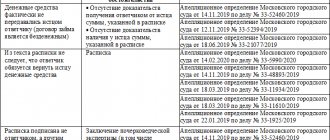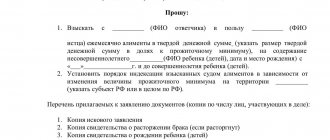Structure and requirements for the document
General requirements for the form and content of the document are established in Art. 131 of the Code of Civil Procedure of the Russian Federation: a claim for the recovery of money must be made only in writing. It states:
- name and address of the court to establish the addressee and verify jurisdiction;
- the name of the plaintiff and defendant, or the name of the organization, or the surname, name, patronymic of an individual (do not forget that economic claims between legal entities and individual entrepreneurs are considered in arbitration). The courts also recommend indicating telephone numbers and other contacts for quick communication with the parties;
- the price of the claim (according to Article 91 of the Code of Civil Procedure of the Russian Federation, this is the full amount of money claimed, except for moral damage);
- amount of state duty.
Next, the name of the document is indicated in the center of the sheet.
Main contents of the claim:
- what is the request to the court (collection of what funds, under what agreement, in what volume);
- the basis for the request is failure to fulfill the terms of the contract, non-payment of interest, etc., which is confirmed by this;
- links to articles of laws (optional, but desirable);
- usually the word “Please” is highlighted in the center, followed by the demand itself indicating specific numbers;
- It is imperative to list the attachments and documents that prove what is stated in the document and are attached to the claim.
Date and signature are also mandatory details of any claim.
Example of a claim for recovery of funds
| IN _____________________________ (name of judicial authority, address) Plaintiff: _________________________ (last name, first name, patronymic in full, address and contact phone number) Respondent: ______________________ (last name, first name, patronymic in full, address and contact phone number) Cost of claim ______________________ (the entire amount of claims under the claim, except for moral damages) State duty_______________________ STATEMENT OF CLAIM on collection of debt incurred under a loan agreement “___”__________ ____, a loan agreement was concluded between me and the defendant _________ (full name), the defendant was lent the amount of _______ rubles, which is confirmed by a receipt from “___”________________. The deadline for the execution of the contract and the return of funds is determined by the contract as follows: “____”_____________. In accordance with Article 810 of the Civil Code of the Russian Federation, the borrower is obliged to return the loan amount to the lender on time and in the manner prescribed by the loan agreement. To date, the debt has not been repaid. Based on the above, guided by Articles 807, 810, 811 of the Civil Code of the Russian Federation, Articles 131-132 of the Civil Procedure Code of the Russian Federation, Ask:
List of documents attached to the application (copies according to the number of persons participating in the case):
Date of presentation of the statement of claim “___”_________ ____ Signature of the plaintiff _______ |
When to file a claim
Legal entities and individuals enter into various contractual relationships. Loan agreements are drawn up to guarantee the return of transferred funds. Return procedures and remuneration are part of this relationship. They are also written down in the agreement in the form of the return date, the amount of interest and the amount of the penalty. Violation of the conditions leads to civil liability. Situations when one of the parties should file a claim for debt collection under a loan agreement:
- the borrower did not repay the funds on time;
- a written reminder to the borrower is made and properly executed.
Where to apply
Disputes between legal entities and individual entrepreneurs are considered by arbitration; disputes between “physicists” are considered by a court of general jurisdiction (magistrates, city, district). A claim is filed with the magistrate for the recovery of funds if the cost of the claim is no more than 50,000 rubles. In case of a dispute involving consumers - if the claim price does not exceed 100,000 rubles (Article 23 of the Code of Civil Procedure of the Russian Federation). According to the general rule set out in Art. 28 of the Code of Civil Procedure of the Russian Federation, the claim is filed at the place of residence of the defendant (location of the legal entity or its branch). There are exceptions: for example, consumers have the right to go to court at their place of residence. The court considers claims on a territorial basis; the territory of their powers is easy to understand from the name (Kurgan City Court considers cases based on claims presented to residents of Kurgan).
General provisions for the delivery of goods
In accordance with the requirements of Articles 506 and 516 of the Civil Code of the Russian Federation, the supplier must transfer to the buyer the goods specified by agreement between them, and the buyer is obliged to pay for the received products. Article 506 of the Civil Code of the Russian Federation indicates that products transferred to the buyer can be used only for business purposes, which presupposes the presence of only business entities in the transaction, thereby excluding individuals from the participants in the transaction.
Part 1 of Article 516 of the Civil Code of the Russian Federation determines that the procedure for payment for delivered products must be determined by agreement of the parties, and if it is not specified in the contract, then payment is made by transferring funds to the supplier’s bank account. If the goods are supplied in several batches, then, in accordance with Part 3 of Article 516 of the Civil Code of the Russian Federation, payment is made after shipment of the last batch, unless otherwise specifically agreed by the parties.
The payment procedure used is very convenient in that the supplier can quickly and accurately establish the fact of payment for the delivered products, as well as the existence of a debt. To do this, you only need to obtain a certificate (statement) from the bank about the status of the account and the movement of funds through it.
Since proof of the fact of debt formation is, in fact, not required, its existence is often obvious from the contents of the agreement and a certificate from the servicing bank, the collection procedure largely becomes formal. Practice knows many cases when debt repayment is carried out pre-trial, that is, through negotiations between the parties. However, if there is still a need to go to arbitration, the supplier must remember the following formalities.
Preparation
Before filing a claim in arbitration court, you need to send a claim to the debtor. This is a must. Otherwise, the court will leave the claim without consideration. The period for responding to a claim, as a general rule, is 30 days. However, this period may be changed by agreement. If you entered into a written agreement with the debtor, then it’s worth looking into it.
Write your claim on the letterhead of your organization (IP). Be sure to include:
- name of the debtor;
- basis for the debt;
- amount of debt;
- deadline for voluntary repayment.
At the end, write down that if the debtor does not pay the debt, you will file a claim in arbitration court. Next, put the date, signature and transcript of the manager.
The claim must be prepared in two copies: one for your company, the second for the debtor. Send a letter with a return notification and a list of the attachments (if you will attach documents confirming the debt). If you decide to submit the claim personally to the debtor, then have him put a stamp of acceptance and date on your copy.
If an answer or money for the debt is not received within the time allotted for consideration of the claim, then prepare a claim in arbitration. To do this, first determine the jurisdiction. As a general rule, a claim must be filed with the arbitration court at the location of the defendant. You can see the exact address in the extract from the Unified State Register of Legal Entities (USRIP).
However, if the agreement between you and the debtor has previously established in which arbitration the disputes will be considered, then the claim must be sent there. Typically this information is listed in the Responsibilities of the Parties section.
Collection of debt for the supply of goods, statute of limitations
Part 5 of Article 4 of the Arbitration Procedure Code of the Russian Federation indicates that the arbitration court has the right to accept a claim only if the parties have complied with the preliminary pre-trial procedure for resolving disagreements, which, in turn, can be determined by law or an agreement between the parties.
It is important to remember that in relation to the supply agreement, the law does not define mandatory pre-trial procedures for resolving disputes. This does not deprive the parties of the opportunity to indicate the obligation to comply with it in the contract.
Therefore, if the contract specifies the obligation to comply with the pre-trial (claims) procedure for resolving disagreements, then it must be observed before going to court. An indication of compliance with this procedure can be the sending by the supplier to the buyer of a claim for repayment of the debt and a negative response to this demand or no response at all within the 30 days allotted by paragraph 5 of Article 4 of the Arbitration Procedure Code of the Russian Federation.
In relation to the collection of debt for supplied products, the general statute of limitations applies, which, in accordance with Article 196 of the Civil Code of the Russian Federation, is equal to 3 years. Article 200 of the Civil Code of the Russian Federation determines that the period begins from the moment when the obligation must be fulfilled. Accordingly, if a debt is formed, the statute of limitations will begin to be calculated from the day following the last day of the period when the buyer had to pay the supplier.
A court order is the main purpose of filing a claim.
After considering the claim itself, analyzing the evidence and positions of the parties, the court makes a decision. Ideally, this will satisfy the requirements in full, although some nuances are possible. Let’s imagine that everything is fine and the court has decided to collect money from the debtor - this is exactly what will be indicated in the decision.
The decision must enter into legal force. A certain period is allotted for this - in our case, it becomes so a month after it is issued. This month is necessary for the defendant to have time to appeal the decision. If he does not do this, the decision is subject to execution, that is, it will be possible to officially involve the bailiff service in the process with clear consequences for the debtor.
It should be remembered that Art. 122 of the Code of Civil Procedure of the Russian Federation establishes a set of requirements for which it is possible to file not a claim, but immediately an application for the issuance of an order for execution. In our case, this will be a transaction with the debtor, which has been notarized. In other words, the process can be accelerated and you don’t have to worry about filing a claim - if the defendant has no objections, after 5 days you can submit an order to the bailiff service.
List of required documents
The list of papers that must be attached to the claim is specified in Article 126 of the Arbitration Procedure Code of the Russian Federation:
- notification that the defendant (third parties) has received a claim and a package of documents attached to it;
- a receipt confirming payment of the state duty in the manner and amount provided for in Article 333.21 of the Tax Code of the Russian Federation;
- a copy of the plaintiff’s state registration certificate, as well as an extract from the Unified State Register of Legal Entities about the location of the plaintiff and defendant (the extract is valid for 30 days from the date of registration);
- a copy of the arbitration court decision to secure the claim, if such measures were taken;
- documents confirming compliance with the pre-trial dispute resolution procedure, if it is required by law;
- documents confirming the authority and right of signature of the plaintiff’s representative;
- documents confirming all the circumstances specified in the claim.
Ways to resolve the situation with the debtor when filing a claim
The legal process is sometimes not brought to its logical conclusion due to the fact that the issue with the debtor can be resolved in advance. Many of the debtors, realizing the inevitability of a decision not in their favor, agree to repay the debt without participating in litigation. As a rule, the parties agree to enter into a settlement agreement on certain conditions beneficial to both.
A settlement agreement can be concluded by the parties at any stage of the civil process and during the execution of a judicial act. Third parties who make independent claims regarding the subject of the dispute have the right to participate in the conclusion of a settlement agreement as a party.
Art. 153.8 Code of Civil Procedure of the Russian Federation
Given the conclusion of such an agreement during the process, it must be approved by the court. As a rule, problems with approval do not arise if the parties clearly agree on the details.







